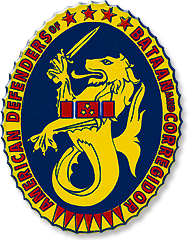
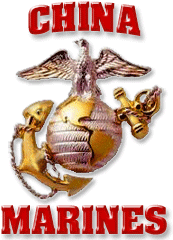
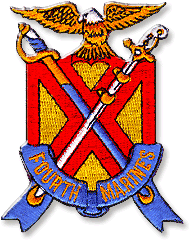
 |
 |
 |
| Fourth Marines Band: "Last China Band" |
|
THE EDGE |
|
CHAPTER THREE - We Were Captured |
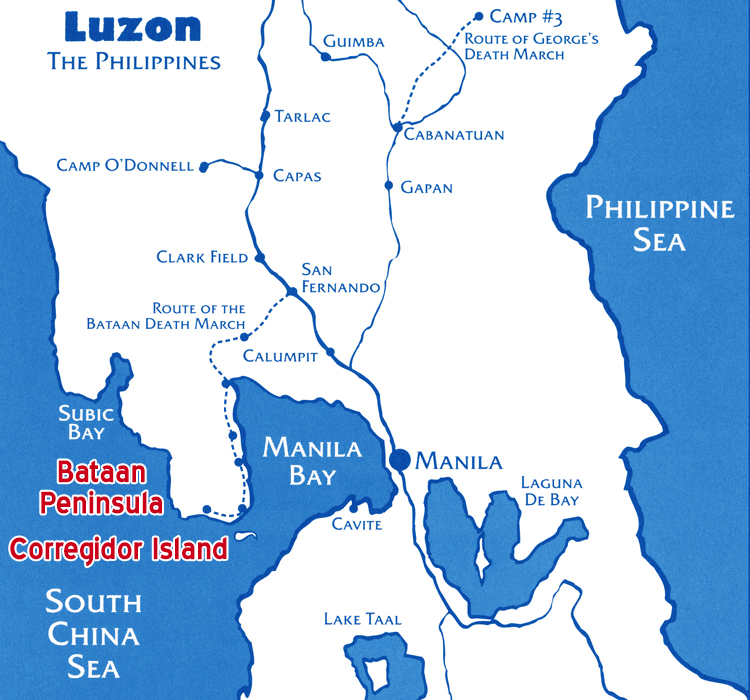
|
|
Back to the Philippines |
|
Our trip from Shanghai to the
Philippines was uneventful except for coming close to a huge Japanese
cruiser. It was an eerie feeling seeing that meatball flag waving in the
breeze. We all thought the war talk was Just that and somehow we didn’t
regard those little brown men scurrying around the deck as our enemies. Boy,
were we wrong! |
|
War Declared |
|
One morning it was December 8
(December 7 in Pearl Harbor) — I woke up at the sound of somebody shooting
off a .45 He was yelling “War has been declared!” “War has been declared!” We hadn’t unpacked our instruments in
any event and we all had regular issue Springfield rifles, of course. Later,
the instruments would be blown up by Marine engineers along with everything
else we thought might be of use to the Japanese. I really hated to lose my
trumpet. It was a Bach Stradivarius trumpet I had bought back in the States
even before I joined the Corps. It cost $300 and I could hit a high “C” on
it that sounded as sweet as any that Gabriel had ever blown. |
|
Corregidor |
|
Someone said that Corregidor
was a heavily fortified island every bit as well defended as the British
base at Gibralter. Corregidor is the largest of four small islands in the
mouth of Manila Bay and just a couple of miles offshore. Actually, it was a
combination of military installations Fort Hood, Fort Drum - which was a
sunken battleship—and Fort Mills, the main island fortress. After looking at all the guns and apparently well trained troops, we wondered how the Japanese could ever conquer this base. It didn’t take very long to find out how! We bandsmen, now an infantry
platoon, a part of the Fourth Marine Regiment, were assigned to a shiny new
barracks building called “Middleside” I guess because there was another
barracks above us called, naturally: “Topside”. A young Army corporal opened what
looked like a trap door in the floor and told all of to get in. “You’ll be
safe in here,” I recall his saying. |
|
Digging In |
|
Soon after that we were
deployed along the sea. We dug foxholes and attempted to fortify the area as
best we could, which wasn’t much. That’s where we stayed until the Japanese
decided to bomb us out. |
|
Face to Face with the Enemy |
|
One day I was on patrol in
the jungle with a four-man patrol when I heard a pop then a small explosion.
I felt a sharp pain in my calf and saw that the Marine in front of me had
been badly hit - apparently by a grenade. I saw this little khaki-clad
figure off to one side of the path. Without really thinking I snapped off a
shot with my Springfield and hit him right in the chest. He was a Japanese
private who apparently had got lost from his outfit and had stumbled on our
patrol by accident. He looked awfully young and not the ferocious enemy we
had been expecting to encounter. I didn’t think much of my wound - it looked
like a small puncture from a grenade fragment. But, later it caused me a lot
of misery. Wounds don’t heal very fast in the tropics and this one was no
exception. Some weeks after I became a prisoner and just when it was
beginning to heal a guard jabbed at it with his bayonet - why I’ll never
know and opened it up again. It took several more weeks to heal but by that
time I had other things to worry about. |
|
Under a White Flag |
|
The landing proved to be
successful and the enemy soon was in the center of the fortress area. And,
on May 8, 1942 the order came down to destroy everything of value. |
 |
|
Telegraph received by
George's Mother on Mother's Day, May 10, 1942, five months after Pearl Harbor. |
|
They lined us up and went up and down our
ranks taking every thing off us they could. I had a ring my grandfather had
given me which I highly prized, It was a gold ring with a ruby, diamond and
emerald setting. It was a magnificent ring and I wasn’t about to let the
Japanese get it. So, I took it off my finger, turned away and threw it as
far as I could in the Bay of Manila. It’s still down there some place and
maybe some day one of my grandsons might go diving for it. They did get my
watch, though, but that was no big deal. They marched us about five miles back to the fort to what was called the “92nd Garage Area”. It had been the motor pool and was a large area adjacent to the bay. There must have been at least ten thousand or more prisoners already there huddled beneath makeshift shelters of all kinds and shapes. The sun beat down unmercifully. There was no water and no food. All I had was a knapsack, with some spare socks and underwear, my canteen and a blanket. No one greeted us and we were directed to a corner of the area where I used the blanket to rig some shade from the blazing sun. There were no latrines and the nearby bay became the toilet for most of us. Even worse than the thirst and the hot sun were the giant, biting blue-black flies that had feasted on the dead bodies of animals and humans but were incessant in their demand for more “food”. After two or three days the Japanese finally put down a 1/2 inch water pipe. We would line up for hours to fill our canteens - if we were lucky. We got no supplies from the Japanese but did find some old C rations that someone had buried in the area. They didn’t last long but did keep us going. The Japanese couldn’t have cared less whether we lived or died. I think we spent maybe about two months in the motor pool area. There were a lot of sick Marines and a couple guys died. Then one morning they marched us to the dock area where there was a big armada of the most ancient sea vessels you could imagine. |
| Death March |
|
I had a really bad fever and didn’t think I
was going to make it. Fortunately, a corpsman slipped me some sulfur pills
and they made me feel a lot better. After climbing aboard one of the really dilapidated boats, I laid down on a strip of metal, not more than six inches across, and fell sound asleep. When I woke up we were just about at the end of Manila Bay. The Japanese jabbing at us with bayonets made us jump into the water which was about waist deep and wade ashore. We were marched down a narrow, dusty road and passed what looked like an elite Japanese cavalry unit with magnificent horses. They jeered at us in Japanese but didn’t bother us. We soon
came to Manila where large crowds of Filipinos had assembled, watching
us—some with tears in their eyes— as we straggled by looking like pretty sad
sacks I’m sure. Some of the Filipinos threw us some peanuts and other small
items of food which we greatly appreciated. |
| I Witness a Murder |
|
We had just arrived at this desolate spot -
tired, hungry, dispirited to say the least, when we came upon four
blindfolded prisoners surrounded by Japanese soldiers with rifles. A young
Japanese officer surprisingly with tears in his eyes offered the prisoners
cigarettes which he put in their mouths and even lit with his lighter. Then,
suddenly he stepped away and gave an order to the soldiers who immediately
fired into the bodies of the four prisoners. They had already been forced to dig their own graves. They were pushed into them and a few shovels full of dirt were tossed over them. Later, we learned the four had been caught after escaping from the camp. It was a harsh lesson. The Japanese assigned us to 10-man squads and we were told by an interpreter that if one tried to escape, all would be shot. But, where would you go anyway? |
| A Miracle? |
|
There I had one of the most unusual spiritual
experiences of my entire life. I had dysentery so bad I had to run for the
latrine about every other minute. I remember being in a terrible amount of
pain and then I completely lost my ability to walk. Some of my buddies
helped me to the latrine which, even though it smelled terrible, seemed to
be the place to be. I lay down in that stinking place and started talking
out loud to myself. A minister later told me I probably was praying and the
man up there was listening. But, I remember saying, “Well, George, you’re close. But, hey, if I’m going to die, let me die now. But, if I’m going to live, then give me the courage to live like a man.” Then, I fell asleep but once I woke up, looked out at the sky and saw clearly the beautiful Southern Cross constellation which is so bright in that part of the world. When I woke up the next morning, my dysentery was gone! Even doctors I have talked to since say it couldn’t have happened that way. That it was impossible. Well, it wasn’t impossible and that’s just the way it happened. It was a miracle. I’m not sure how long we stayed at this camp. It was almost unbearable and the Japanese finally closed it because even they considered it unlivable. So, they moved us to the largest POW camp at Cabanatuan, located about 6o miles north of Manila. There must have been upwards of 3000 prisoners there—a mixture of Marines, Army and Navy. Unfortunately, I came down with a severe case of malaria with a fever raging above 105 for several days. I wouldn’t have made it had it not been for Dr. J.E. Nardoni—a doctor I had known in Shanghai, who gave me some me some quinine pills (see foreword). That broke the fever and I slowly recovered enough to go back on a work detail. We were assigned to clear a large area of land for crops of some kind—I never found out what. |
| EDITOR’S NOTE: This story was also written by George some years later. |
| “OnIy That One Hour” |
|
Gene Roberts was afraid of snakes. Trapped on
a beach with a tidal wave approaching, a Bela Lugosi vampire bending over
his bed these were scant fears compared to his vision of a Cobra, head
raised, hood extended, striking viciously at his defenseless body. He remembered the rattlesnake that killed his dog on the steps of his Grandfather’s mountain home. He remembered too the way he died. Now, here he was in the middle of cobra country, rice snakes and pythons. The python you could struggle with, the other two were slithering death warrants. Don Ford, Air Force, Jay Burton, Marine corporal and Doc Wendall, Navy medic, the ant bangers they called themselves. Also known, by their Japanese captors in this P.O.W. camp in Cabanatuan, Philippine Islands, as ichi bon exterminators of red ant hills. They gathered around in the early dawn, squatting, oriental fashion as they passed a long brown stogie for each to get a puff or two. “Where in the hell is Megaphone,” Don rasped, his early morning voice still hoarse. “Son of a bitch is always screwing off if he’s not trying to beat us to death.” Jay’s voice was bitter. “Here he comes now. Bet he’s had the Honcho Domo biting him in the ass for more work from us lazy, free loading captives.” Don’s last remark got him a prod from the long rod the Jap carried in his hand. “Bakka, domi da na,” he motioned them to their feet. In broken English punctuated with Japanese he laid out the day’s work. “Honcho say, you lazy bums, no good, beat you more. Today we break seven ants or you all die tomorrow.” “O.K. bakka bastards, we go.” Doc led the way across the open land toward a distant ant hill. Megaphone kept pointing out the direction away from a long line of gathering prisoners. They were all mostly armed with picks and an occasional shovel, a gigantic cultivating machine impeded only by the eight-foot-high ant hills. As they approached the ant hill, Megaphone, his hands cupped to his mouth yelled at them that any snakes were his. “Doc, do you have anything in case we get bit?” Gene’s voice was tense, fright already straining at his vocal cords. “Nothing kid, my old kit bag has a few compresses with a little tape to hold it and that's all. Wait a minute! I think I may have a vial of morphine left. That could ease your suffering a little.” He laughed. Doc. liked his little morbid jokes. The ant bangers started hacking at the ant hill. Their bare feet shuffling to avoid the huge, red, jigger ants that were pouring from their sanctuary deep inside the hill. Occasionally someone would jump and cuss the red insect that had bitten him. Megaphone, his face imperturbably set, would only look away. Jay Burton, the Marine from Corregidor, was busy following a small hole that led deeper and deeper into the ant hill. Gene was watching him closely anticipating his own quick departure if a snake emerged. Jay’s pick crumbled another small tunnel when, with an almost imperceptible motion, an eight foot cobra was at his feet. Everyone jumped back along with Jay. The snake coiled it’s body erect, hood flared, ready to attack. Gene, his face white and taut, screamed for Megaphone who had wandered off to gossip with the other guards. “Let him be, Gene.” Jay’s face was flushed, his pick ready to hit the snake. “Let him be. If we kill the snake that’s one less for him.” The snake was swaying from side to side lost in it’s own internal rhythms. Its tongue flickered in and out of its mouth in a deadly osculating caress. The sun was barely up but the perspiration was beginning to run down the faces of the ant bangers. Doc spoke quickly, “Be careful, there could he two.” All eyes went to the small holes proliferating the ant hill. Don looked quickly, “No snake. Where in the hell is that no good Megaphone.” |
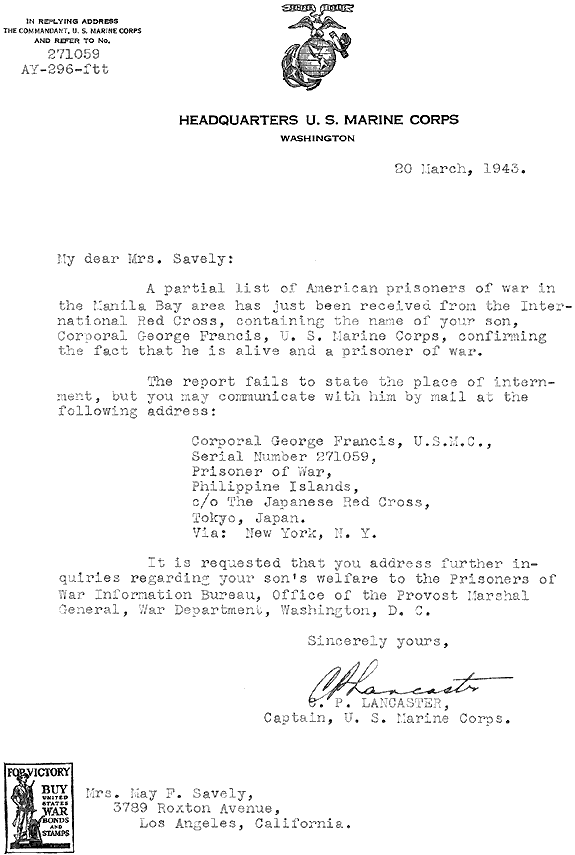 |
| Letter received by George's Mother on March 20, 1943 - ten months after the "Missing Pending Further Information Telegram". |
|
“Snaku, Aii-ah, me kill.” Megaphone pushed
the group back and dropped to his knees in front of the cobra. Gene thought he looked as if he had come to pray until he saw the small stick in his hand. Megaphone began to imitate the slow undulant sway of the serpent. Slowly his right hand moved higher and imperceptibly closer to the moving head of the reptile. His hand, with the swiftness of a practiced magician, dropped the stick and grasped the snake behind the head. Gene’s sigh of relief was audible as the rest of the group dropped their picks and squatted on the ground. The cobra was wrapping his tensile body around Megaphone’s arm struggling to be free. With a long sharp knife Megaphone was cutting into the mouth of the snake removing his fangs and then probing deeper for the poison sacks. When he had finished, washed and examined the snake’s mouth he released his grip. Free, the snake mouthed his way up Megaphone’s arm in a futile attempt to bite him. The men were lined up ready to move to another ant hill when Megaphone turned and tossed the snake high on top of their heads. Gene, who had stood relaxed in the middle of the group found a wildly flailing eight foot cobra wrapping itself around his neck. No nightmare would ever be this real. He pulled the irate snake from his neck and looked around for Megaphone, who happy with himself, was strolling away. Gene, cupped his hands to his mouth and yelled, “Megaphone, you son of a bitch.” His angry voice caught everyone’s attention. Megaphone, his cap perched jauntily on the back of his head, never looked around. |
| EDITOR’S NOTE: George Francis was Jay Burton |
| Another Encounter with Megaphone |
| I was to have another encounter with Megaphone. Some days after the cobra incident I was squatting in the field digging. Most of us prisoners could never master the Oriental technique of squatting on our haunches. It was another way guards found to torture us. Anyway, I stood up to ease a cramp in my legs when I was knocked to the ground with a blow to my back. I was momentarily stunned and then I was seized with a fit of rage that I couldn’t control. I jumped to my feet and was eye to eye with Megaphone who had knocked me down. I started for him with an intent to kill him with my bare hands. He just smiled and unsheathed his bayonet which he jammed into my stomach inviting me to attack. I quickly decided that death in that field was no revenge at all. So I turned my back and bent down to continue my digging. |
|
|
|
Received by George's Mother on September 8, 1943 - another similar card was received on December 16, 1943, two months after George was sent to Japan. |
| Volunteer to Japan |
|
I was in the Cabanatuan camp about nine
months and was trying to adjust to being a POW. It wasn’t easy! I tried to
concentrate on my great love for music and literature and I think that kept
me going. Sometime in October 1943, I joined some 500 other Marines who had been ordered to report to the train station. For some reason dumb I found out later - I had volunteered to transfer to a camp in Japan. (think my reasoning was that perhaps (would be closer to a food supply. That wasn’t the best thought I ever had. We were quickly loaded onto one of those terrible box cars and taken back to Manila. We couldn’t see much of the city but obviously the Japanese were in complete control. We saw no friendly crowds and no one threw us any food scraps. I’m sure the Filipinos were feeling the pain of being under Japanese rule, too. They marched us onto one of the most derelict tramp steamers I have ever seen—much older and more decrepit than the one we had been on before. Two strange things happened on that trip to Japan—which we soon found out was our destination. We were allowed to stay topside as the ship moved out of Manila Bay. I was up forward on the bow and looked out to see the largest snake I had ever seen swimming alongside. That sucker had to be 20 feet long. I think it must have been a python but it scared the devil out of me just thinking what might happen if I fell overboard. On our way to Japan across the China Sea we ran into a terrible typhoon that tossed that old bucket around like it was a tea cup. I bet the waves were better than 40 feet high and how we stayed afloat remains a mystery.
But, actually that trip to Japan wasn’t that bad after
we cleared the typhoon. We ate the best chow we’d had since becoming POWs.
We even got some kind of meat once in awhile. The Japanese crew left us
alone for the most part— no beatings, no work parties. |
| EDITOR’S NOTE: Here is another story George wrote some time ago. You readers perhaps can see the difference in style from his recently-dictated notes. |
| “Escape to Nirvana” |
|
Jay Burton stood in the last door of the last
car as it slowly moved along the siding. This was Niigata. He had seen the
sign on the main station they had passed. It was in English despite the war
and the Japanese fanatical devotion to end all things foreign to its
culture. The train inched its way through the switches and the masts of
cargo ships became visible over the corrugated iron sheds that made up most
of the buildings. Huge mountains of coal began to appear as the train lost
speed and with a great screeching of brakes stuttered to a halt. Jay could
see the Japanese soldiers gathered along the embankment and the civilians,
some of them in suits, who were now running along side the train
gesticulating at the conductors who were standing on the steps of the doors. Jay had counted nearly 300 men aboard the train. They were all fellow Marines from the Philippines, veterans now of the fighting at Bataan and Corregidor. Most of them skinny and still suffering from malnutrition, beri beri, and malaria which would subside now in the colder climate of Northern Japan. Some of the men were starting to disembark, pushed by the Japanese aboard the train and exhorted by the soldiers who were standing now at the ends of the cars. Suddenly a short, squatty, soldier ran down the siding screaming, “Bakka, Bakka,” his sword held high above his head, his face flushed and his mouth twisted in anger. Jay knew the word he was screaming as did all the prisoners. The Japanese used it all the time. One of the prisoners had wandered beyond the last car and was the object of the Banzai charge. The Japanese soldier was now yelling obscenities in the face of the prisoner, cuss words, that only the most profane would know. A mixture of Japanese and English that ended when he brought his sword down across the head of the cowering prisoner. Fortunately the weapon was sheathed and the damage only resulted in a slow leaking wound that soon stopped bleeding. Someone behind Jay whispered, “He was like a cyclone coming down on poor, Jay.” The name stuck and the Japanese sergeant was named, “Cyclone Pete” from then on. The soldiers were starting to herd the prisoners into a column of twos, yelling the usual cuss words, Bakka, Conyero, accompanied by shoves with their rifle butts and an occasional kick. The newly named “Cyclone Pete” was in the middle of the melee lending his strident voice to the sorting. Jay slung his pack across his shoulder and moved to find a place in the line. The column straggled out, a long line of white faced Marines, fatigued from the long journey they had made - Manila Bay, then a stop in Taikow on the island of Taiwan. Six weeks of sitting in the middle of the small harbor at Taikow while being injected for Bubonic Plague epidemic in the area. Finally, setting sail in the China Sea with thunderous typhoon assaulting their small freighter with fifty and sixty foot waves, submerging the accompanying destroyer escort for what seemed to Jay an eternity. He had never experienced the violence of winds and the churning of the waters that he had seer that day. For no reason he thought of his Grandmother ministering to a cut eye he had suffered playing sandlot baseball. Her gentle hands wiped away the hurt. He needed her now. The front of the column stopped and the prisoners immediately put down the knapsacks and blanket rolls they carried. “Cyclone Pete” came down the column yelling at the prisoners and guards alike. Jay started to laugh. “Where,” he said aloud, “would anyone escape to? Swim to China? Were there Communist guerilla bands loose in Japan, eh?” Cyclone coming back down the column bumped him hard in the middle of his back. “Domi da na,” he said, “Toske”. Jay was slow coming to attention and Cyclone brought his fist up in a swift chop across his mouth. Blood slowly trickled down across his chin. Jay knew this would be a losing fight. He wanted to survive Cyclone and Camp 5-B Niigata, Japan. |
| EDITOR’S NOTE: Again, George was Jay Burton |
| Full Text of THE EDGE | Please Click Below for: |
| CHAPTER ONE - "The Edge" | Page 13 |
| CHAPTER TWO - First Duty Stations | Page 19 |
| CHAPTER THREE - We Were Captured | Page 39 |
| CHAPTER FOUR - In The Camp | Page 59 |
| CHAPTER FIVE - Return to Niigata | Page 80 |
| From the Diary The Letters Poems and Short Stories "Marines in Review" Epilogue Chronology Bibliography |
Page 91 |
| Return to THE EDGE Introduction Page |
| EMAIL: info@4thmarinesband.com |
| ©2000-2021 lastchinaband.com. All rights reserved. |